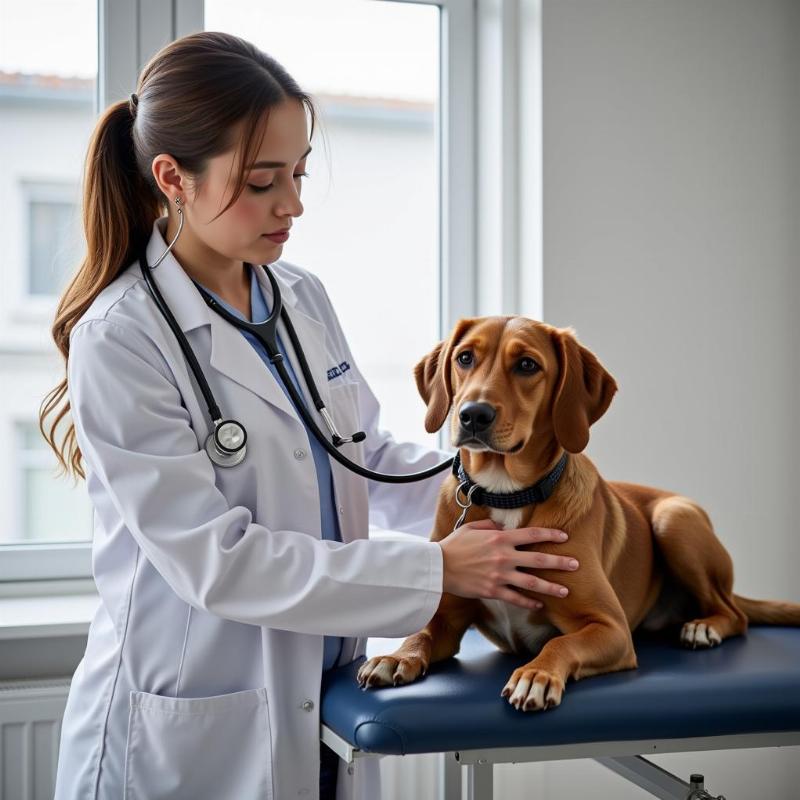Getting your dog to poop faster can be a common concern for pet owners, especially when time is limited or your furry friend seems uncomfortable. Understanding why your dog might be taking a while and knowing how to encourage quicker bowel movements can make a big difference in both your lives. From dietary adjustments to creating a comfortable potty environment, we’ll explore effective strategies to help your dog poop faster and more regularly.
Understanding Your Dog’s Pooping Habits
Before diving into solutions, it’s important to understand what’s normal for your dog. Frequency can vary depending on breed, size, age, diet, and activity level. While some dogs poop multiple times a day, others might only go once. Observe your dog’s typical routine to establish a baseline and identify any significant deviations. Sudden changes in bowel movement frequency or consistency can signal underlying health issues and warrant a vet visit.
Dietary Strategies to Speed Up Pooping
Your dog’s diet plays a crucial role in their digestive health and bowel movements. Fiber is key to promoting regularity. Adding pumpkin puree (not pie filling) to your dog’s food can be a simple and effective way to increase fiber intake. Similarly, adding a small amount of bran cereal can also help. Be sure to introduce these changes gradually to avoid upsetting your dog’s stomach. High-quality dog food formulated for digestive health can also make a difference. Always consult your veterinarian before making significant dietary changes, especially if your dog has existing health conditions.
Creating a Comfortable Pooping Environment
Just like humans, dogs can be sensitive to their surroundings when it comes to using the bathroom. A designated potty area in your yard can help create a sense of routine and comfort. Ensure the area is clean and free of distractions. Some dogs prefer privacy, so a quiet corner might be ideal. If your dog is hesitant to poop, try taking them on a walk. The movement and change of scenery can often stimulate bowel movements.
Exercise and Hydration: Key to Faster Pooping
Regular exercise is vital for your dog’s overall health and can also promote regular bowel movements. Physical activity stimulates the digestive system and helps things move along. A brisk walk, a game of fetch, or even a short play session in the yard can make a difference. Equally important is proper hydration. Make sure your dog always has access to fresh, clean water. Dehydration can lead to constipation, making it harder for your dog to poop.
When to Consult a Veterinarian
While some changes in bowel movements are normal, others can indicate a more serious problem. If your dog experiences sudden constipation, diarrhea, straining to poop, or bloody stool, consult your veterinarian immediately. These could be signs of underlying health issues that require professional attention. Don’t hesitate to seek advice if you’re concerned about your dog’s pooping habits.
Addressing Underlying Health Issues
Sometimes, difficulty pooping can be a symptom of a larger health concern. Conditions like hypothyroidism, megacolon, or certain neurological disorders can affect bowel movements. A thorough veterinary examination can help identify and address these underlying issues. Early diagnosis and treatment are crucial for managing these conditions and ensuring your dog’s overall well-being.
 Veterinarian Examining a Dog
Veterinarian Examining a Dog
Conclusion
Helping your dog poop faster involves a combination of dietary adjustments, environmental considerations, and ensuring adequate exercise and hydration. While these strategies can be effective, it’s essential to monitor your dog’s overall health and consult a veterinarian if you notice any concerning changes in their bowel movements. With patience and the right approach, you can help your dog establish healthy pooping habits and ensure their comfort and well-being. how to get my dog to poop faster is a common concern, and addressing it proactively contributes to your dog’s overall health and happiness.
FAQ
- How often should my dog poop? Most dogs poop once or twice a day, but frequency can vary.
- Is it normal for my dog to strain while pooping? Occasional straining can be normal, but persistent straining could indicate a problem.
- What can I give my dog to help them poop? Pumpkin puree and bran cereal can add fiber to their diet, but consult your vet first.
- How can I make my dog more comfortable pooping? Create a designated potty area and ensure it’s clean and free of distractions.
- When should I be concerned about my dog’s pooping habits? Consult your vet if you notice sudden changes in frequency, consistency, or if your dog appears to be in pain.
- Can exercise help my dog poop faster? Yes, physical activity can stimulate the digestive system and promote bowel movements.
- What are some signs of digestive problems in dogs? Changes in appetite, vomiting, diarrhea, constipation, and weight loss can all be signs of digestive issues.
Related Articles
Beautdogs.us is your premier source for all things dog-related in the USA. We offer expert advice on dog breeds, care, and lifestyle, featuring a wide range of products and services tailored to the American pet owner. Whether you’re a seasoned dog owner or just starting out, Beautdogs.us provides reliable, comprehensive, and engaging information to help you navigate the joys and responsibilities of dog ownership. Contact us for all your dog-related inquiries at [email protected] or +1 501-555-7529. Visit Beautdogs.us for more information.